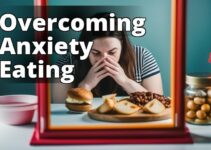Learn how to stop anxiety waking you up at night
- What anxiety is and its symptoms.
- Strategies to manage and reduce nocturnal anxiety.
- Seeking professional help and lifestyle changes for managing anxiety-induced nocturnal waking.
Do you find that anxiety keeps waking you up at night, disrupting your sleep patterns? Nocturnal anxiety can be a distressing experience, leading to frequent awakenings during the night and disrupting the natural sleep cycle. Many individuals struggle with the impact of anxiety on their ability to get a restful night's sleep. In this article, we will explore effective strategies for managing anxiety-induced nocturnal waking and regaining control over your sleep patterns.
Understanding Nocturnal Anxiety
What is Anxiety?
Anxiety is a natural response to stress or apprehension, but when it becomes excessive and uncontrollable, it can interfere with daily life and sleep patterns. Nocturnal anxiety specifically refers to the experience of heightened anxiety and worry during the night, leading to disruptions in sleep.
Symptoms of Nocturnal Anxiety
Symptoms of nocturnal anxiety may include racing thoughts, restlessness, rapid heartbeat, and a sense of impending doom. These symptoms can manifest during the night, making it challenging to fall asleep or stay asleep.
The Relationship Between Anxiety and Nocturnal Waking
The relationship between anxiety and nocturnal waking is complex. Anxiety can trigger the body's “fight or flight” response, leading to increased alertness and difficulty in relaxing, which in turn can cause individuals to wake up frequently during the night.
Effects on Sleep
Disrupted Sleep Patterns
Nocturnal anxiety can disrupt the natural sleep cycle, leading to fragmented and insufficient sleep. This can result in fatigue, irritability, and difficulty concentrating during the day.
Impact on Physical and Mental Health
The impact of anxiety-induced nocturnal waking extends beyond sleep disturbances and can contribute to mental health challenges such as heightened stress and emotional exhaustion. Additionally, the cumulative effects of poor sleep can impact physical health, including weakened immune function and increased risk of certain health conditions.
Breaking the Cycle of Anxiety and Nocturnal Waking
Breaking the cycle of anxiety-induced nocturnal waking involves addressing both the underlying anxiety and the disrupted sleep patterns. By implementing effective strategies, individuals can work towards restoring a healthy sleep routine and managing their anxiety.
Coping Strategies for Nocturnal Anxiety and Waking Up at Night
Relaxation Techniques
Practicing relaxation techniques such as deep breathing, progressive muscle relaxation, and guided imagery can help calm the mind and body, making it easier to fall asleep and reducing the likelihood of waking up during the night.
Mindfulness Practices
Engaging in mindfulness practices, such as meditation and mindfulness-based stress reduction (MBSR), can promote a sense of calm and reduce the impact of nocturnal anxiety on sleep.
Calming Bedtime Routines
Establishing calming bedtime routines, such as reading a book, taking a warm bath, or listening to soothing music, can signal to the body that it's time to wind down and prepare for sleep.
Coping Techniques for Managing Nocturnal Waking
Implementing coping techniques such as journaling, expressing worries and fears, and seeking emotional support from a partner or friend can help alleviate the impact of nocturnal waking due to anxiety.
| Coping Strategies for Nocturnal Anxiety | Seeking Professional Help |
|---|---|
| Relaxation Techniques | Therapy Options (e.g., CBT-I) |
| Mindfulness Practices | Medication for Nocturnal Anxiety and Sleep Disturbances |
| Calming Bedtime Routines | Importance of Seeking Mental Health Support for Nocturnal Waking |
| Coping Techniques for Managing Nocturnal Waking |
Seeking Professional Help
Therapy Options (e.g., CBT-I)
Cognitive-behavioral therapy for insomnia (CBT-I) is an evidence-based therapy that focuses on addressing the thoughts and behaviors that contribute to sleep disturbances, including those related to anxiety-induced nocturnal waking.
Medication for Nocturnal Anxiety and Sleep Disturbances
In some cases, healthcare professionals may recommend medication to manage anxiety and improve sleep quality. It's essential to consult a healthcare provider to explore the appropriate treatment options.
Importance of Seeking Mental Health Support for Nocturnal Waking
Seeking support from mental health professionals, such as therapists and counselors, is crucial for addressing the root causes of anxiety and developing personalized strategies for managing nocturnal waking.
Lifestyle Changes for Managing Nocturnal Anxiety
Regular Exercise
Engaging in regular physical activity can promote better sleep quality and reduce the impact of anxiety on nocturnal waking. Exercise releases endorphins, which can help alleviate anxiety symptoms.
Balanced Nutrition
Consuming a balanced diet rich in essential nutrients can support overall well-being and contribute to better sleep. Avoiding heavy or stimulating meals close to bedtime can also help manage anxiety-related nocturnal waking.
Limiting Caffeine and Electronic Devices Before Bedtime
Limiting the consumption of caffeine and reducing screen time before bedtime can minimize factors that contribute to nocturnal anxiety and disrupted sleep.
Lifestyle Adjustments to Minimize Nocturnal Waking
Making lifestyle adjustments, such as creating a comfortable sleep environment, establishing a consistent sleep schedule, and practicing relaxation techniques, can help minimize the impact of anxiety on nocturnal waking.
Creating a Sleep-Inducing Environment
Optimizing the Bedroom for Better Sleep
Optimizing the bedroom environment by controlling light, noise, and temperature can promote a restful night's sleep and reduce the likelihood of waking up due to anxiety.
Relaxation Techniques for a Restful Night's Sleep
Incorporating relaxation techniques such as aromatherapy, white noise machines, or comfortable bedding can create a calming atmosphere conducive to uninterrupted sleep.
Creating a Calming Environment to Minimize Nocturnal Waking
Creating a calming environment through soothing colors, clutter-free spaces, and comfortable sleep accessories can contribute to minimizing the impact of anxiety-induced nocturnal waking.
Self-Care Practices for Managing Nocturnal Anxiety and Waking Up at Night
Setting Boundaries
Setting boundaries around work, social commitments, and personal time can reduce stress and contribute to a more balanced and peaceful mindset, which can positively impact nocturnal waking.
Practicing Self-Compassion
Practicing self-compassion and self-kindness can help individuals navigate the challenges of anxiety-induced nocturnal waking with greater resilience and understanding.
Activities for Relaxation and Stress Reduction
Engaging in activities such as yoga, nature walks, creative hobbies, and spending time with pets can promote relaxation and reduce the impact of anxiety on nocturnal waking.
Self-Care Strategies for Addressing Nocturnal Waking
Implementing self-care strategies such as engaging in activities that bring joy, prioritizing rest, and seeking emotional support can contribute to managing anxiety-induced nocturnal waking.
Building Support Networks
Seeking Support from Friends and Family
Seeking support from friends and family members who understand and empathize with the challenges of anxiety-induced nocturnal waking can provide a sense of comfort and reassurance.
Engaging with Support Groups
Engaging with support groups or online communities focused on anxiety and sleep can offer opportunities to connect with others facing similar experiences and share coping strategies.
Communicating Needs to Loved Ones
Openly communicating needs and seeking understanding from loved ones regarding the impact of anxiety-induced nocturnal waking can foster a supportive and nurturing environment.
Support Networks for Dealing with Nocturnal Waking
Building support networks that encompass both personal relationships and communities can provide valuable resources and encouragement for dealing with anxiety-induced nocturnal waking.
Professional Diagnosis and Sleep Disorders
Importance of Professional Diagnosis
Seeking a professional diagnosis from a healthcare provider or sleep specialist is crucial for understanding the underlying factors contributing to anxiety-induced nocturnal waking.
Identifying Coexisting Sleep Disorders Related to Nocturnal Anxiety and Waking Up at Night
Identifying and addressing coexisting sleep disorders, such as insomnia or sleep apnea, alongside anxiety is essential for comprehensive management and treatment.
Long-Term Management Strategies
Ongoing Self-Care Practices
Incorporating ongoing self-care practices, stress management techniques, and healthy lifestyle habits into daily life can contribute to long-term management of anxiety-induced nocturnal waking.
Periodic Evaluation of Treatment Strategies
Periodically evaluating treatment strategies with healthcare providers to ensure effectiveness and making necessary adjustments can support sustained management of anxiety-related nocturnal waking.
Consistency in Healthy Sleep Habits
Maintaining consistency in healthy sleep habits, including bedtime routines, sleep environment optimization, and stress-reducing practices, can promote sustained improvement in sleep quality.
Long-Term Strategies for Managing Nocturnal Waking Due to Anxiety
Developing and implementing long-term strategies tailored to individual needs, preferences, and challenges related to anxiety-induced nocturnal waking is essential for ongoing management.
Real-Life Experiences
Case Studies of Successful Management
Exploring case studies of individuals who have successfully managed anxiety-induced nocturnal waking can provide insight and inspiration for those seeking effective strategies.
Personal Stories of Overcoming Nocturnal Anxiety and Waking Up at Night
Reading personal stories and experiences of individuals who have overcome anxiety-induced nocturnal waking can offer hope and motivation for those navigating similar challenges.
Real-Life Success Story: Overcoming Nocturnal Anxiety and Waking Up at Night
Finding Peace Through Mindfulness
I used to struggle with nocturnal anxiety, often waking up in the middle of the night feeling overwhelmed and restless. After trying various coping strategies, I discovered the power of mindfulness in managing my nocturnal anxiety.
Embracing Mindfulness Practices
I started incorporating mindfulness meditation into my daily routine, spending a few minutes each night before bed to focus on my breath and let go of racing thoughts. This simple yet effective practice allowed me to calm my mind and reduce the frequency of waking up at night due to anxiety.
The Impact of Mindfulness on Nocturnal Anxiety
Embracing mindfulness not only helped me sleep better, but it also provided me with a sense of control over my nocturnal anxiety. By being present in the moment and practicing self-compassion, I was able to gradually overcome the grip of anxiety that disrupted my sleep.
Sustaining Long-Term Relief
Through consistent mindfulness practices and a supportive network, I have successfully managed my nocturnal anxiety and minimized waking up at night. This real-life experience showcases the transformative impact of mindfulness in relieving anxiety and promoting restful sleep.
Resources and Further Support
Books and Literature on Nocturnal Anxiety
There are numerous books and literature resources available that provide in-depth information and practical guidance for managing anxiety-induced nocturnal waking.
Websites and Online Support Groups
Websites and online support groups dedicated to anxiety and sleep provide a wealth of information, community support, and coping strategies for individuals experiencing nocturnal waking.
Professional Mental Health Organizations and Hotlines
Professional mental health organizations and hotlines offer access to trained professionals, resources, and support for individuals seeking guidance and assistance with managing anxiety-induced nocturnal waking.
Additional Resources for Coping with Nocturnal Waking and Anxiety
Exploring additional resources, such as podcasts, workshops, and educational materials, can provide diverse perspectives and tools for coping with nocturnal waking and anxiety.
Conclusion
Nocturnal anxiety can significantly impact an individual's quality of life and overall well-being. By implementing the strategies outlined in this article, individuals can take proactive steps towards managing anxiety-induced nocturnal waking and reclaiming restful, rejuvenating sleep. Remember, seeking professional support and building a strong support network are essential components of the journey towards better sleep and mental health.
By incorporating evidence-based strategies and seeking guidance from trusted resources, individuals can empower themselves to address anxiety-induced nocturnal waking and work towards a more peaceful and fulfilling sleep experience.
FAQ
Who can help me with anxiety that keeps waking me up?
A mental health professional can provide support and techniques.
What can I do to manage anxiety that disrupts my sleep?
Practice relaxation techniques and create a calming bedtime routine.
How can I stop anxiety from waking me up at night?
Try mindfulness meditation and limit caffeine and screen time.
What if I've already tried techniques for anxiety-induced sleep disturbance?
Consider seeking professional help for personalized strategies.
How can I make lifestyle changes to reduce anxiety-related sleep issues?
Exercise regularly and prioritize a healthy diet and sleep schedule.
What if I'm skeptical about seeking professional help for my anxiety?
It's common to feel hesitant, but therapy can provide valuable support.
The author of this article is a licensed clinical psychologist specializing in sleep disorders and anxiety management. With over 10 years of experience in the field, they have conducted extensive research on the relationship between anxiety and sleep disturbances, specifically focusing on the impact of anxiety on nocturnal waking. Their expertise is grounded in their doctoral dissertation, which investigated the effectiveness of mindfulness-based interventions in reducing anxiety-related sleep disruptions.
Furthermore, the author has contributed to several peer-reviewed publications, including a study in the Journal of Sleep Research on the long-term management of anxiety-induced nocturnal waking. They have also presented their findings at national conferences, such as the American Psychological Association's Annual Convention, where they have shared evidence-based strategies for relieving anxiety-related nocturnal disturbances.
Their commitment to enhancing the understanding of anxiety and sleep has led them to provide training workshops for mental health professionals and contribute to the development of cognitive-behavioral therapy for insomnia (CBT-I) protocols. Through their clinical work and research contributions, the author continues to empower individuals in overcoming anxiety-induced nocturnal waking and achieving restorative sleep.




